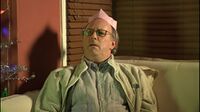Peter Davison: Difference between revisions
No edit summary |
|||
| Line 21: | Line 21: | ||
[[Category:Doctor Who regular cast|Davison, Peter]] | [[Category:Doctor Who regular cast|Davison, Peter]] | ||
[[Category:Actors who portrayed the Doctor|Davison, Peter]] | [[Category:Actors who portrayed the Doctor|Davison, Peter]] | ||
Peter Davison watched Doctor Who when he was a kid, when WIlliam Hartnell and Partick Troughton played The Doctor. | |||
Revision as of 13:08, 4 June 2008
Peter Davison (born 13 April, 1951) is the stage name of Peter Moffett, who played the fifth incarnation of the Doctor from 1981 to 1984, beginning with the conclusion of "Logopolis" and ending with "The Caves of Androzani." He reprised the role for the 1993 Children in Need special, "Dimensions in Time", again for the 2007 Children in Need special "Time Crash", and has also voiced the Doctor for numerous Doctor Who audio dramas for Big Finish. Davison is also well-known for his roles as Tristan Farnon in All Creatures Great and Small.
Davison was born Peter Moffett in London. His father was originally from Guyana. He studied at the Central School of Speech and Drama, and appeared in several stage productions and some minor television roles before he got his big break in 1978. His performance as the ne'er-do-well Tristan Farnon in All Creatures Great and Small made him a household name. He married American actress Sandra Dickinson in the same year, but they divorced in 1994. He and Dickinson had previously appeared together in an episode ("A Man for Emily") of the television series The Tomorrow People (1975) and together composed and performed the theme tune to Button Moon, a children's programme broadcast in the 1980s. He made a cameo appearance alongside Dickinson as the Dish of the Day in the television version of The Hitchhiker's Guide to the Galaxy (1981), whose producers considered it humorous for an actor known for playing a veterinary surgeon to appear as a cow. Davison also appeared in some British sitcoms, including Holding the Fort, Sink or Swim and Ain't Misbehavin, as well as appearing in dramatic roles.
In 1981, Davison signed a contract to play the Doctor for three years, succeeding Tom Baker (the Fourth Doctor). Attracting such a high-profile actor was as much of a coup for the programme's producers as getting the role was for him, but he did not renew his contract because he feared being typecast. Reportedly, Patrick Troughton (who had played the Second Doctor) had recommended to Davison that he leave the role after three years, and Davison followed his advice.
It was not until 1986 that Davison worked on another very popular series. He played Dr Stephen Daker, the ingenuous hero of A Very Peculiar Practice, written by Andrew Davies. The surreal comedy-drama was revived several years later as A Very Polish Practice. Davison also played the lead in Campion, a series based on the period whodunnits of Margery Allingham. This, and the opportunity to play Tristan Farnon again in 1985 and 1990, kept Davison busy until the early 1990s, when he gradually faded from the public eye. He continued to appear occasionally on television, including an appearance on the American show Magnum, P.I., but it was not until 2000 that he returned in another major role, that of David Braithwaite in At Home with the Braithwaites.
In 1999 he appeared as the outgoing headteacher in Hope And Glory.
He has also starred in the television series The Last Detective (2003-date) and Distant Shores (2005) for ITV, the latter where he coincidentally also played a doctor. His daughter with Dickinson, Georgia Moffett, is also an actress--she allegedly auditioned for the role of Rose Tyler, former companion of the Ninth and Tenth Doctors, and was eventually cast as Jenny in the Series 4 episode The Doctor's Daughter.
External links
- Peter Davison at the Internet Movie Database
- Violence & Vulnerability - Peter Davison article at Kasterborous.com
Template:Wikipedia Peter Davison watched Doctor Who when he was a kid, when WIlliam Hartnell and Partick Troughton played The Doctor.

